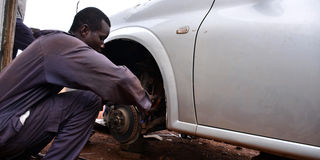Prime
Essential car checks ahead of the holidays

For most of these car checks, it is best to take the car to your trusted mechanic. PHOTO/Promise Twinamukye
What you need to know:
The festive season is upon us and this is the time most of us make those long journeys to different destinations to celebrate with friends and family. These are the car checks to make before embarking on that long journey
The festive season is finally here, and as tradition has it, many of us will be going to the village (countryside) to celebrate Christmas with family. What any car owner does every morning is to simply get into their car and drive to their desired destination. This is okay, especially if the car served its purpose the previous day.
However, when it comes to long distance driving, it is important to ensure that your car is in perfect shape before you start the journey. The last thing you want is your car breaking down in the middle of nowhere with the nearest mechanic miles away. Here are key checks every car owner should do before travelling this festive season:
Engine
The engine is the heart of your car. It is a complex machine built to convert heat from burning fuel into the force that turns the road wheels. In this case, the first thing to look at is engine oil. Use your deep stick to ascertain if it is enough or not and if it is not, make sure you go for a top up before you start the journey.
According to a mechanic at Total Energies, who prefers anonymity, car engines require a given amount of engine oil to run smoothly. When your car is low on engine oil, your engine is most likely to knock, causing the car to break down.
“When a car is brought in for servicing, we replace the engine oil and normally, we use oil that will enable the car cover an average of about 5,000 kilometres before the need to replace the oil again. For example, if you are to travel to Arua City in Northern Uganda and have already covered 4,600 kilometres, you have 400 left. For you to make this journey again, you will have to have your engine oil checked and topped up,” he explains.
You should also check your engine’s cooling system. Make sure you have enough coolant in the radiator and that there are no leakages.
“The engine heats up when driving. So, if you are to drive a long distance, the engine will heat up even more, as there will be constant acceleration, which is why there should be enough coolant to cool it down,” says Mark Kyaze, a mechanic at DS Motor Garage.
Kyaze adds that the best time to open the radiator and check for your coolant or water levels is in the morning, when the car is cool.
Although most people consider water a good alternative for coolant, Kyazze says water is ineffective and can be hazardous, to both the car and the driver.
“Because coolant is expensive, most motorists use water instead. However, water has a low boiling point. Car engine temperatures can go as high as 600 degrees celsius in which case the water, whose boiling point is 100 degrees celcius will boil and evaporate, instead of serving its purpose as a coolant,” Kyazze explains, adding that water will also cause your radiator to rust.
A motorist should also ensure that their gearbox oil is enough. Also check for your hydrolic oil levels. This, which is also known as power steering fluid helps with smooth steering of the car.
Battery
Make sure the battery has enough electrolyte (battery water). Most batteries have provisions on the side to show you if your battery water level is low or enough.
“A car will fail to start simply because the battery water level is low. Also, make sure the battery terminals are firmly attached onto the battery. Sometimes, your car may fail to start if the terminals are loose,” Kyaze explains.
Tyres
Tyre pressure plays critical part in ensuring everyone’s safety on the road. According to pupkewitz-motors.com, a tyre’s correct air pressure helps to distribute the weight of your vehicle evenly across the tyre tread patterns, so that the vehicle is stable on the road. When your tyres under inflated, they lose stability, grip and traction, which affects handling, cornering and stopping. The steering wheel will also become sloppy and braking will be slower.
According to Samuel Dumba, a mechanic, underinflated tyres, also increase the fuel consumption of the car.
“Low tyre pressure will force the vehicle to work harder because of the increased resistance the tyres face when moving,” Dumba explains. You can check your tyre pressure from any petrol station near you.
Your tyres should also be in good shape with all the treads intact. If you drive a car with worn out treads, the heat caused by friction can cause them to bust. Also, when the treads are worn out, then the car is most likely to lose stability, especially on rainy days when the roads are slippery.
Dumba also emphasises the need for a spare tyre.
Brakes
You can tell if your brakes are faulty when they make a squeaking sound every time you step on them. Also, make sure your car has enough brake fluid as this facilitates the car braking process. The brake fluid tank has a maximum and minimum level point to show you how much you have left.
Lights
All the lights should be functioning effectively.
“If you are driving at night and your headlights are deem or one was completely blown out, another car driver might confuse you for boda boda. If you are turning left from the main road and your indicator lights do not work, you may end up in a collision with a car behind you,” Dumba explains.
Wiper blades
If your wiper blades are worn out and it happens to rain heavily while you drive, then you will not be able to clear the rain from the windscreen which will affect your visibility, which might cause a fatal accident. Additionally, make sure you have enough water in the wiper water tank as well as adding some some liquid soap in the water.
Lastly, when driving, do not ignore the dashboard warning lights.
“The check engine light is usually the most serious and feared warning because of the kind of damage it can signal. This warning often indicates the potential for serious engine damage. When ignored, your vehicle could suffer from a blown head gasket or a seized engine,” Kyazze warns.
Clean your car cabin for a healthy trip
Cleaning and disinfecting a car’s interior is an often neglected, yet essential element of car maintenance. Parts of the driver’s cabin that see frequent use can become breeding grounds for bacteria, including the steering wheel, gear stick lever and touch screens, as well as the switches and buttons. So, go over these parts of the cabin with a basic domestic disinfectant.




